In This Episode << SLIDE LEFT TO SEE ADDITIONAL SEGMENTS
Hispanic Voters 2004
BOB ABERNETHY, anchor: Today, the last of our special election series on voting blocs: Hispanic voters. Analysts agree Latinos will play a key role on Tuesday (Nov. 2). In 2003, Latinos surpassed African Americans as the nation’s largest minority group. It’s a community that is still developing politically, and religion is an important part of that development. Ninety-three percent of all Latinos in the U.S. identify themselves as Christians, the majority of them Roman Catholic. Kim Lawton has our report about the faith-based influences on Hispanic voters.
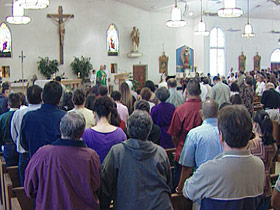
KIM LAWTON: In the battleground state of New Mexico, new recruits are being enlisted after Sunday Mass. A community group called VIVA — the Voters Initiative for Voices in Action — has come to St. Ann Catholic Church in Deming to register new voters. It’s a nonpartisan project targeting Latinos.
SANTIAGO JUAREZ (Voters Initiative for Voices in Action): What we’re trying to do is reach a community and reach communities that have not been engaged.
LAWTON: Santiago Juarez and his colleague Paco Vallejos are both Roman Catholics. They partnered with the Diocese of Las Cruces to encourage parishioners in this largely Hispanic area to see voting as part of their moral responsibility as citizens.
PACO VALLEJOS (During Mass): The Catholic Church is not saying which candidate it endorses — it doesn’t. Which party it endorses — it doesn’t. It’s simply saying to us to do your work. Change the world. Use your conscience.
Mr. JUAREZ: There’s a line in the Our Father, you know, “Thy will be done on Earth as it is in Heaven.” Well, there’s one way we exercise “thy will … on Earth,” and that is we get involved in the political process.
LAWTON: Hispanics are now the largest minority group in the country, but their political strength is still largely untapped. Experts say faith-based groups are having a key influence as Latinos develop their political muscle.
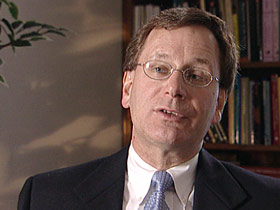
Professor TIMOTHY MATOVINA (University of Notre Dame, Cushwa Center for the Study of American Catholicism): They look to the Church for advice on how to live in a new and different environment. And so when the Church encourages civic participation by voter registration, by becoming concerned and knowledgeable about the issues, by voting responsibly, this carries tremendous weight with Hispanics.
LAWTON: There are roughly 40 million Latinos in the U.S. right now, and almost 40 percent of them are under the age of 18. Between 8 and 10 million Latinos are registered to vote this year. According to the U.S. Census Bureau, the Hispanic population is expected to triple over the next 50 years. That’s a lot of votes up for grabs.
There is great ethnic and economic diversity within the Hispanic community, and that is reflected in politics as well. In 2000, about two thirds of Latinos voted for Al Gore. But the Democrats don’t have a lock on the community.
Professor Timothy Matovina directs Notre Dame’s Cushwa Center for the Study of American Catholicism. He has written widely about Latinos.
Prof. MATOVINA: The Hispanic vote is not a single unified bloc. It tends to still be very strongly in the Democratic Party, but because of Cubans, who vote along their interests, their national interests on the island, because of upward mobility, because of some resonance with Republican stands on moral issues, there are a number of reasons why Republicans are gaining a somewhat more important percentage of the Latino vote.
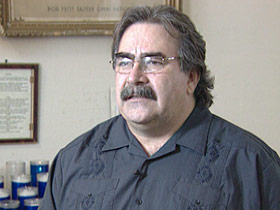
LAWTON: Santiago Juarez is a longtime community organizer. He says Latinos prioritize a variety of issues.
Mr. JUAREZ: There’s not a question that we’re concerned about immigration, but like I said, we’re also concerned about health care. We’re also concerned about Social Security. We’re also concerned about good jobs. We’re also concerned about education.
LAWTON: But Hispanic voters do not fit easily in traditional political categories. The community leans liberal on economic issues, but conservative on social issues like abortion and gay marriage.
The evangelical ministry, Focus on the Family, has launched a new campaign urging Hispanics to begin voting on those social issues.
YURI MANTILLA (On Radio): Vote por sus valores. Vote for your values. I mean, there is nothing more important in your life than to be consistent with your moral values.
LAWTON: Yuri Mantilla is leading the campaign.
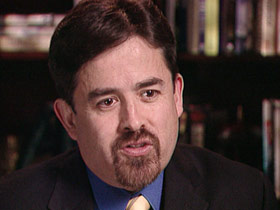
Mr. MANTILLA: We know for sure that the majority of Hispanics are pro-life and pro-family. The issue of abortion, the issue of stem cell research, the issue of homosexual marriage are issues that are going to affect our children, our grandchildren, the future of our nation.
LAWTON: He says the issue of gay marriage in particular is galvanizing Latinos.
Mr. MANTILLA: You need to understand that the Hispanic culture is so pro-family that to tell Hispanics that marriage is not the union between a man and a woman, forget it. You immigrated to this country, now marriage is going to be the union between a man and a man and a woman and a woman? That’s absolutely unacceptable to Hispanics.
LAWTON: Mantilla found a receptive audience at the “America for Jesus” rally in Washington, D.C., which was organized by leaders of the growing Latino Protestant movement.
Mr. MANTILLA (During Rally): We ask, Lord Jesus, that you will give us godly leadership, that we will see more Christians in government.
LAWTON: But others wonder how effective the campaign will be among Latinos.
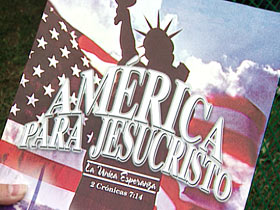
Prof. MATOVINA: They tend to be far more concerned in their voting patterns with the issues that affect their families, day-to-day living in their own family lives, such as education, immigration, welfare, job training, concern for youth, and so on. And so I think they tend to be — they are more important issues on which they base their vote.
LAWTON: Others worry an emphasis on abortion and gay marriage could put conflicting pressures on Hispanics and discourage some from voting at all.
Mr. JUAREZ: The issues around gay marriage, the issues around abortion are not designed to say, “Go vote about it.” They’re designed to say, “You know what? That’s one you can’t win, so stay at home.”
LAWTON: The candidates have been actively courting Hispanic support. Many of those efforts clearly acknowledge the deep spirituality among Latinos. George Bush’s Spanish-language Web site emphasizes compassion and the faith-based initiative.
And weeks before he began talking about religion on the campaign trail, John Kerry released a Spanish-language TV ad that said, “Faith is the foundation of our culture. We need a leader guided by this value.”
Prof. MATOVINA: While Latinos don’t want to kind of see too close of an alliance with church and state, I think they do want to know the person they’re voting for is a person they can trust. And to them, a person they can trust means a person who has a deep-based faith in God, which guides their life.
LAWTON: In this tight race, Latinos say they are discovering their potential political power.
Mr. MANTILLA: The Hispanic vote is going to be the swing vote. It’s going to be the vote that decides who the next President of the United States will be. But imagine in the next 10 years, in the next 15 years. The influence of the Hispanic community is going to grow even more. That’s why it will be impossible for any political party, for any candidate, to win elections without considering the Hispanic vote.
LAWTON: I’m Kim Lawton reporting.

